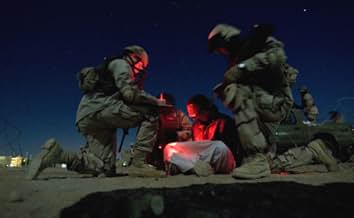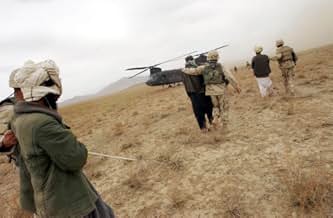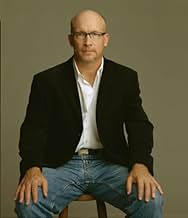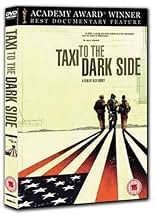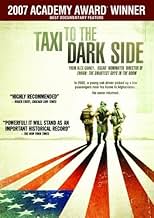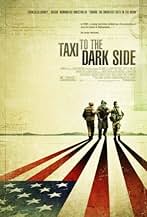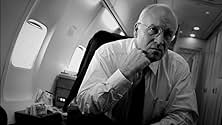Alex Gibney exposes the haunting details of the USA's torture and interrogation practices during the War in Afghanistan.Alex Gibney exposes the haunting details of the USA's torture and interrogation practices during the War in Afghanistan.Alex Gibney exposes the haunting details of the USA's torture and interrogation practices during the War in Afghanistan.
- Won 1 Oscar
- 10 wins & 5 nominations total
Alex Gibney
- Narrator
- (voice)
Moazzam Begg
- Self - Torture Victim
- (as Moazzam Beg)
George W. Bush
- Self
- (archive footage)
Jack Cafferty
- Self
- (archive footage)
Dick Cheney
- Self
- (archive footage)
Lynndie England
- Self
- (archive footage)
Tommy Franks
- Self - General
- (archive footage)
- Director
- Writer
- All cast & crew
- Production, box office & more at IMDbPro
Featured reviews
Yep, it is another one of those Iraq and Afghanistan documentaries. I know the burnout rate is high on these, which is probably why I almost did not bother, but nothing else was showing. Man, was I happy I saw this! It has rekindled my hate for the Bush administration, which had turned to apathy over the last year. This tells the story of an Afghani taxi driver that is mistakenly picked up as a Taliban supporter, but before they find out he was innocent, he has been beaten to death by his American torturers.
This film has interviews from all of the guards that were responsible, JAG officers, FBI people, CIA agents on the ground etc. And you see that all of the blame lies with Ashcroft and the Bushies, who gave one vague order after another that they wanted confessions and they wanted them quickly, with a wink and a nod about what kind of methods to use. So you have these frustrated high school drop-outs presiding over these people thousands of miles from anywhere, and they won't confess. So, beatings and humiliations follow. And when the crap comes out, the Bush administration passes a bill that absolves all higher-ups from any responsibility and they start to bust the enlisted men and women, who were following orders. Pathetic. Of course, we also find out that over 95% of the prisoners being held, were captured by Pakistanis and Northern Alliance people, WHO were paid by the US government for each person they turned over, guilty or not guilty. And you wonder why meaningful confessions were so hard to come by. It reminds me of the scene from Full Metal Jacket, where the psycho army guy shoots the Vietnamese farmers from his helicopter. He says the ones that run are VC, the ones that don't run are well trained VC. Very tragic.
This film has interviews from all of the guards that were responsible, JAG officers, FBI people, CIA agents on the ground etc. And you see that all of the blame lies with Ashcroft and the Bushies, who gave one vague order after another that they wanted confessions and they wanted them quickly, with a wink and a nod about what kind of methods to use. So you have these frustrated high school drop-outs presiding over these people thousands of miles from anywhere, and they won't confess. So, beatings and humiliations follow. And when the crap comes out, the Bush administration passes a bill that absolves all higher-ups from any responsibility and they start to bust the enlisted men and women, who were following orders. Pathetic. Of course, we also find out that over 95% of the prisoners being held, were captured by Pakistanis and Northern Alliance people, WHO were paid by the US government for each person they turned over, guilty or not guilty. And you wonder why meaningful confessions were so hard to come by. It reminds me of the scene from Full Metal Jacket, where the psycho army guy shoots the Vietnamese farmers from his helicopter. He says the ones that run are VC, the ones that don't run are well trained VC. Very tragic.
Taxi to the Dark Side accomplishes what a documentary, or just a concise analysis, regarding all of the facts in one of the many nightmares the United States' involvement in the middle east should: to inspire the utmost disgust and condemnation of a system that has become as corrupt as it has (or rather always has been with this bunch). It's uncontainable to think how all of this started, grew exponentially, and resulted ultimately in the horrors at Abu Gharyb and Guantanamo Bay, in that it is nestled in the twisted, criminal (yes folks, criminal) 'policies' of the Bush administration. But Alex Gibney's approach isn't narrow-minded but multi-faceted: he's interested in what a complex, ugly organism torture has become, the psychological just as much as the physical, and he has a man at the center of it. Dilawar, an innocent taxi driver from a poor farm in Afghanistan, was swept up by three other Afghan soldiers and sent to Bagram prison, where along with other supposed terrorists or terrorist collaborators was tortured (in his case especially in brutal fashion, as we learn in graphic description from those who participated first-hand), and died from the trauma.
His death was a controversy, but not one that ever got the kind of attention it deserved; until this documentary I never even heard of Dilawar or even much about Bagram prison. Yet it was at this prison, as well as the first biggie interrogation of the would-be 20th hijacker of the plane on 9/11 to crash in Pennsylvania (which, by false confession, led to an over-excited but false-rooted assumption that Al Quaeda had links to Baghdad), that led to Abu Gharyb, which revealed the horrors of soldiers in unyielding terror over their subjects but, more importantly, the virus that spread through the chain of command. Gibney's approach is approximate and expertly probing: it's not enough to just focus of Dilawar (even as his story could make up a whole legitimate documentary alone), or on Abu Gharyb. As in his previous film, Enron: The Smartest Guys in the Room, it's essential to dissect this wretched beast from top to bottom, to see not simply the soldiers first-hand accounts, but straight from the horse's mouth the words from Cheney, Rumsfeld, Powell, and Bush himself.
Because, in reality, there is something to feel sorry for with these soldiers. It can be argued, and not without just cause, that what the soldiers did at Bagram, Abu Gharyb, and to an extent even at GITMO, was wrong and rotten and they could have said no and so on and so forth. However, as with the ground war situation in Iraq, it's all about the chain of command, and the fact that no matter what the parties initially responsible are not held accountable for any of their actions. It's almost frightening to forget the amount of footage available with these men like Rumsfeld and Gonzalez and Cheney where they not only admit to being fine with torture tactics - and whether or not it's psychological torture or not is besides the point as ALL torture IS torture, albeit a facet that Gibney brilliantly chronicles in the history of the CIA to its 'logical' extension in recent years - but set it up in legal wrangling so as to not get it any trouble for what they've done which is, of course, breaking Geneva conventions and whatnot.
If I sound like I'm sounding bias with this, then you should leave this review right now. There is no bias when it comes to this issue (or rather there SHOULD be no bias, as for a split second McCain showed until he relented recently that torture isn't as bad as he used to think). What one sees as the line between what is proper interrogation of a subject and outright abuse to get that "ticking time-bomb" is revealed by Kloogman from the FBI, who paraphrases how an interrogation would usually be done and lays it on the line that this form has actually had results - not pain and death or, at best, a bull**** court at GITMO where it's like a joke Kafka wouldn't write. Gibney presents all the information with the bluntness that's required, with testimony, footage from press conferences and commissions (i.e. that cringe-inducing bit with Gonzalez where he has a horrible pause when trying to answer a simple question about whether or not to condone torture), and it's presented lucidly, edited for a cumulative effect and with the skill of a filmmaker in total trust with his subject(s) to take all of the pieces into a whole that shakes one to the core.
And all of this would be powerful enough to make an impact, but with the recent explosion of news coverage on water-boarding - and that the CIA has admitted to torturing three subjects - Taxi to the Dark Side remains startlingly relevant. In fact, it's even more tragically relevant than last year's Sicko or even No End in Sight. From the tragedy of Dilawar to the tragedy of Abu Gharyb, which was like Salo turned into as shockingly real as could never be imaginable, the Bush administration has put the US into even more danger than ever before by resorting to the lowest form of humanity, condoning acts to the soldiers that sixty years ago would never be committed in the harshest of circumstances on our side. This, again, isn't some silly bias, this is just fact. It's enough to make one sick to one's stomach, and as long as a film such as this exists, the pain can't be brushed aside or dulled by diverting network news.
His death was a controversy, but not one that ever got the kind of attention it deserved; until this documentary I never even heard of Dilawar or even much about Bagram prison. Yet it was at this prison, as well as the first biggie interrogation of the would-be 20th hijacker of the plane on 9/11 to crash in Pennsylvania (which, by false confession, led to an over-excited but false-rooted assumption that Al Quaeda had links to Baghdad), that led to Abu Gharyb, which revealed the horrors of soldiers in unyielding terror over their subjects but, more importantly, the virus that spread through the chain of command. Gibney's approach is approximate and expertly probing: it's not enough to just focus of Dilawar (even as his story could make up a whole legitimate documentary alone), or on Abu Gharyb. As in his previous film, Enron: The Smartest Guys in the Room, it's essential to dissect this wretched beast from top to bottom, to see not simply the soldiers first-hand accounts, but straight from the horse's mouth the words from Cheney, Rumsfeld, Powell, and Bush himself.
Because, in reality, there is something to feel sorry for with these soldiers. It can be argued, and not without just cause, that what the soldiers did at Bagram, Abu Gharyb, and to an extent even at GITMO, was wrong and rotten and they could have said no and so on and so forth. However, as with the ground war situation in Iraq, it's all about the chain of command, and the fact that no matter what the parties initially responsible are not held accountable for any of their actions. It's almost frightening to forget the amount of footage available with these men like Rumsfeld and Gonzalez and Cheney where they not only admit to being fine with torture tactics - and whether or not it's psychological torture or not is besides the point as ALL torture IS torture, albeit a facet that Gibney brilliantly chronicles in the history of the CIA to its 'logical' extension in recent years - but set it up in legal wrangling so as to not get it any trouble for what they've done which is, of course, breaking Geneva conventions and whatnot.
If I sound like I'm sounding bias with this, then you should leave this review right now. There is no bias when it comes to this issue (or rather there SHOULD be no bias, as for a split second McCain showed until he relented recently that torture isn't as bad as he used to think). What one sees as the line between what is proper interrogation of a subject and outright abuse to get that "ticking time-bomb" is revealed by Kloogman from the FBI, who paraphrases how an interrogation would usually be done and lays it on the line that this form has actually had results - not pain and death or, at best, a bull**** court at GITMO where it's like a joke Kafka wouldn't write. Gibney presents all the information with the bluntness that's required, with testimony, footage from press conferences and commissions (i.e. that cringe-inducing bit with Gonzalez where he has a horrible pause when trying to answer a simple question about whether or not to condone torture), and it's presented lucidly, edited for a cumulative effect and with the skill of a filmmaker in total trust with his subject(s) to take all of the pieces into a whole that shakes one to the core.
And all of this would be powerful enough to make an impact, but with the recent explosion of news coverage on water-boarding - and that the CIA has admitted to torturing three subjects - Taxi to the Dark Side remains startlingly relevant. In fact, it's even more tragically relevant than last year's Sicko or even No End in Sight. From the tragedy of Dilawar to the tragedy of Abu Gharyb, which was like Salo turned into as shockingly real as could never be imaginable, the Bush administration has put the US into even more danger than ever before by resorting to the lowest form of humanity, condoning acts to the soldiers that sixty years ago would never be committed in the harshest of circumstances on our side. This, again, isn't some silly bias, this is just fact. It's enough to make one sick to one's stomach, and as long as a film such as this exists, the pain can't be brushed aside or dulled by diverting network news.
This horrifying documentary won the Oscar for 2007. Using the case of an innocent Afghan taxi driver who were tortured to death by American interrogators in Bagram prison as the starting point, the film chronicles the atrocities committed by the Bush administration in the name of American people and an ill-defined 'war on terror'.
The film is written, directed and narrated by Alex Gibney, son of a high-ranking naval officer who was an interrogator in World War II. A great American and a true patriot, Frank Gibney's final disappointment of what became of the great nation of the United States in the hands of a few liars is heart-wrenching.
There is not a single frame in the film that is not supported by hard evidence. All of the investigation was conducted by Americans whose credentials of decency and patriotism are above suspicion. The film is a chronicle of how paranoia, self-serving deceit and mere stupidity can threaten the very values a great nation was built on. It should be impossible for anyone who watches this meticulous document to ever criticize the veracity of claims put forward by the recent films, Rendition, In the Valley of Elah, or Redacted - flawed as films though that they were.
Every person in the world, especially every American, that cares about the true nature of freedom and the sanctity of the individual (the basic tenets on which America was built) should see this film. How could anyone claim that it would be loved only by the supporters of Taliban is beyond me.
The film is written, directed and narrated by Alex Gibney, son of a high-ranking naval officer who was an interrogator in World War II. A great American and a true patriot, Frank Gibney's final disappointment of what became of the great nation of the United States in the hands of a few liars is heart-wrenching.
There is not a single frame in the film that is not supported by hard evidence. All of the investigation was conducted by Americans whose credentials of decency and patriotism are above suspicion. The film is a chronicle of how paranoia, self-serving deceit and mere stupidity can threaten the very values a great nation was built on. It should be impossible for anyone who watches this meticulous document to ever criticize the veracity of claims put forward by the recent films, Rendition, In the Valley of Elah, or Redacted - flawed as films though that they were.
Every person in the world, especially every American, that cares about the true nature of freedom and the sanctity of the individual (the basic tenets on which America was built) should see this film. How could anyone claim that it would be loved only by the supporters of Taliban is beyond me.
This film is a worthy attempt to bring what has become a familiar subject throughout the Bush years without necessarily giving the other side an opportunity to state their case. While I personally support what the film is saying about questionable, even criminal policies of the Bush Administration's view on "interrogation" as a betrayal of all this country holds dear, the film leaves itself open to attack which is unfortunate. Tidbits are cherry picked from interviews and Congressional testimony, and while it's understandable that major players didn't want to sit down and give an interview, it's glaring that they aren't given an chance to explain why they've said what they said. I'll acknowledge the filmmaker probably has it right, but nevertheless, it's an unfair tactic.
The chief first hand accounts of information are from U.S. Military personnel who have been convicted of crimes (with the exception of one British national who has a harrowing, convincing story to tell). While what they have to say is compelling, the absence of any testimony of those who gave them those orders is absent. We have their attorneys or third parties removed to interpret what happened...or might have happened. While I couldn't be more sympathetic to the bind we've placed our young men and women in, the last thing I wanted to hear from an individual who's been convicted of torture and "wrongful death" (labeled a homicide by the coroner) is "I'm financially ruined." The moral quandary raised by the film isn't nearly answered until the final credits roll.
And where is Congress? Where is the oversight they are obligated to perform? Oh, they're holding hearings on steroid use in baseball.
We're never sure exactly what we're looking at. "Reenactments" are identified briefly, but clearly there is a lot that isn't documentary footage, and the famous photos of Abu Ghrabib reappear over and over frequently out of context.
This is a shameful chapter in American history, and it needs a less doctrinaire film to expose what are, as pointed out, crimes of war. One of the most effective moments is when the filmmaker's father appears over the closing credits. He is a former interrogator in WWII. His outrage rings true, and it should be every American's cry as well.
The chief first hand accounts of information are from U.S. Military personnel who have been convicted of crimes (with the exception of one British national who has a harrowing, convincing story to tell). While what they have to say is compelling, the absence of any testimony of those who gave them those orders is absent. We have their attorneys or third parties removed to interpret what happened...or might have happened. While I couldn't be more sympathetic to the bind we've placed our young men and women in, the last thing I wanted to hear from an individual who's been convicted of torture and "wrongful death" (labeled a homicide by the coroner) is "I'm financially ruined." The moral quandary raised by the film isn't nearly answered until the final credits roll.
And where is Congress? Where is the oversight they are obligated to perform? Oh, they're holding hearings on steroid use in baseball.
We're never sure exactly what we're looking at. "Reenactments" are identified briefly, but clearly there is a lot that isn't documentary footage, and the famous photos of Abu Ghrabib reappear over and over frequently out of context.
This is a shameful chapter in American history, and it needs a less doctrinaire film to expose what are, as pointed out, crimes of war. One of the most effective moments is when the filmmaker's father appears over the closing credits. He is a former interrogator in WWII. His outrage rings true, and it should be every American's cry as well.
10blubb06
... at least not on Discovery Channel.
Said director Alex Gibney recently (on DemocracyNow): "Well, it turns out that the Discovery Channel isn't so interested in discovery. I mean, I heard that I was told a little bit before my Academy Award nomination that they had no intention of airing the film..."
Discovery Channel has bought the exclusive TV rights for the next 3 years, but Gibney hopes they can be persuaded to sell them "for a profit".
And it is a powerful film. Although it reveals nothing new about the torture and degrading techniques we've become accustomed to over the last three years, it puts politician's faces and statements in context with a "real" victim and a name: young Afghan Taxi driver Dilawar, who was arrested at a checkpoint for alleged involvement in a rocket attack. Five days later he died at Bagram, after two days of continuous beatings, standing up in chains inside his solitary confinement cell. The American coroner checked "homicide" on his death certificate and handed it with the body to his family, who couldn't read English.
The film then takes us along the ride from Afghanistan to the present day. Dilawar was only the beginning, and one of two detainees who died from torture roughly at the same time. Today, about 180 people have died in custody, 38 with "homicide" on their death certificates. Dilawar's torturers tell their story. They took the rap, they repent, but is this justice? What's the bigger picture, the one that's usually glossed over, and the reason Discovery deems this documentary "controversial"?
Alex Gibney dismantles "Torture the American way" just like he did the Enron scandal in "Enron: The smartest guys in the room", from the inside to the bigger inside, like a Russian doll. You will hear the words "war crimes", see the infamous torture memo, Abu Ghraib photos and film, Kiefer Sutherland torturing with electric wires, Guantanamo, Cheney, Rumsfield, Bush and their lawyers wriggling around the t-word and egging on that "we must take our gloves off". "We have to work the dark side, if you will. We're going to spend time in the shadows", says Cheney.
"But... is the dark side stronger?"
"No. Quicker, easier, more seductive. Anger, fear, aggression, the dark side are they.
"Once you start down the dark path, forever will it dominate your destiny."
Said director Alex Gibney recently (on DemocracyNow): "Well, it turns out that the Discovery Channel isn't so interested in discovery. I mean, I heard that I was told a little bit before my Academy Award nomination that they had no intention of airing the film..."
Discovery Channel has bought the exclusive TV rights for the next 3 years, but Gibney hopes they can be persuaded to sell them "for a profit".
And it is a powerful film. Although it reveals nothing new about the torture and degrading techniques we've become accustomed to over the last three years, it puts politician's faces and statements in context with a "real" victim and a name: young Afghan Taxi driver Dilawar, who was arrested at a checkpoint for alleged involvement in a rocket attack. Five days later he died at Bagram, after two days of continuous beatings, standing up in chains inside his solitary confinement cell. The American coroner checked "homicide" on his death certificate and handed it with the body to his family, who couldn't read English.
The film then takes us along the ride from Afghanistan to the present day. Dilawar was only the beginning, and one of two detainees who died from torture roughly at the same time. Today, about 180 people have died in custody, 38 with "homicide" on their death certificates. Dilawar's torturers tell their story. They took the rap, they repent, but is this justice? What's the bigger picture, the one that's usually glossed over, and the reason Discovery deems this documentary "controversial"?
Alex Gibney dismantles "Torture the American way" just like he did the Enron scandal in "Enron: The smartest guys in the room", from the inside to the bigger inside, like a Russian doll. You will hear the words "war crimes", see the infamous torture memo, Abu Ghraib photos and film, Kiefer Sutherland torturing with electric wires, Guantanamo, Cheney, Rumsfield, Bush and their lawyers wriggling around the t-word and egging on that "we must take our gloves off". "We have to work the dark side, if you will. We're going to spend time in the shadows", says Cheney.
"But... is the dark side stronger?"
"No. Quicker, easier, more seductive. Anger, fear, aggression, the dark side are they.
"Once you start down the dark path, forever will it dominate your destiny."
Did you know
- Quotes
Damien Corsetti - Military Interrogator: You put people into a crazy situation, people will do crazy things.
- SoundtracksIn My Little Corner of the World
Words by Bob Hilliard Music by Lee Pockriss
Published by Better Half Music (Division of Bourne Co.)
and Emily Music Corporation
Performed by Yo La Tengo
Courtesy of Matador Records
- How long is Taxi to the Dark Side?Powered by Alexa
Details
Box office
- Budget
- $1,000,000 (estimated)
- Gross US & Canada
- $274,661
- Opening weekend US & Canada
- $10,930
- Jan 20, 2008
- Gross worldwide
- $294,309
- Runtime1 hour 46 minutes
- Color
- Sound mix
- Aspect ratio
- 1.85 : 1
Contribute to this page
Suggest an edit or add missing content






